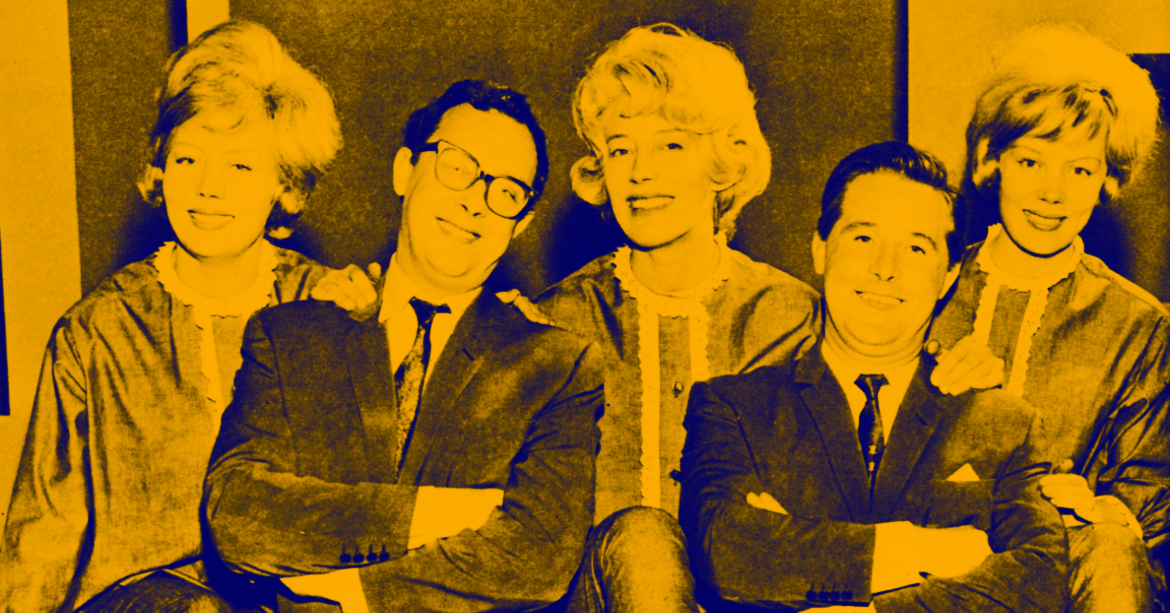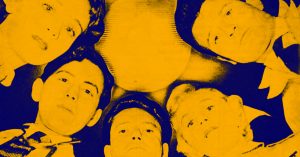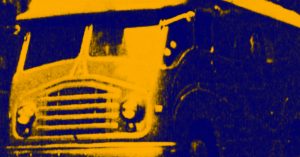Morecambe and Wise
Meet the stars of ATV’s hit comedy sketch show in 1962

TO GET A comedian to say something funny off-stage is generally nearly impossible. The great majority of show business funny-men find that being amusing is a very serious occupation.

So when Morecambe and Wise breezed into ATV’s headquarters to talk about themselves we wondered what was coming next. We soon found out.
The tall, bespectacled Eric Morecambe set things going when he suddenly stopped, clapped an outstretched hand under his partner’s chin and said: ‘get out of that,’ the phrase that has become so popular through their ATV programmes.
After that it was laughter all the way. The wisecracks flowed thick and fast. Finally, with patience, the comics were persuaded to be serious, at least long enough to tell their story—how they met, parted, met up again and finally achieved success.
‘We were travelling from Birmingham to Coventry during the blitz,’ said Ernie Wise, ‘when Eric’s mother, Mrs. Bartholomew, who was accompanying us to a show, suggested that we should try to become a double act. Eric and I had known each other for a few months, as we were both appearing in Bryan Michie’s show Youth Takes a Bow. The idea appealed to us and we decided to give it a try.’
The youngsters did team up and this was the beginning of an act which has now established itself with a string of successful television shows, summer revues, pantomimes and a weekly series for ATV.

‘We had not had time to establish ourselves as a double act before Ernie joined the Merchant Navy, cut in Eric Morecambe. ‘When he went away I teamed up with the brother of the late Dave Morris as a ‘feed’ and this is when I dropped my real name — Bartholomew — and took the name of my home town. We became Morris and Morecambe. This partnership did not last long, however. I was conscripted — into the coal mines — and disappeared from view for a while.’
Their reunion was a chance meeting. They were both booked as single acts in a Sanger’s Circus show in 1947. This led to Morecambe and Wise re-forming their double act.
‘I bumped into Eric,’ recalls Wise, ‘and we decided to try our luck again. Before the road show ended we had re-established our act. It was at this time that I met my wife, Doreen, who was a dancer in the show.’
‘We were only just making a living in those days,’ confided Morecambe. ‘If I remember rightly we earned £12 a week and had to divide that in half. After the tour we went into pantomime with Lupino Lane and from there to variety and revues.’
In 1952 Eric Morecambe met Joan, an ex-beauty queen, who was a dancer in a show which featured Morecambe and Wise in Edinburgh. In December of that year Eric and Joan, a London-born girl, were married.

‘It was in 1952 that we decided we ought to broadcast,’ said Wise. ‘We cornered a radio producer at the Tivoli Theatre, Hull, one evening and before we were through with him we had earned ourselves a spot in Workers’ Playtime. This led to many other broadcasts. After that things really began to move for us. Our money must have gone up a little by that time because in 1953 I could afford to marry Doreen’.
Before long Morecambe and Wise had their own radio series in the North of England called You’re Only Young Once, and this met with such success that they were asked to do three more series. Then came television. The comics did their first television show in 1953 and were then offered a series of their own. The series was called Running Wild and was seen in 1954.
‘It ran wild all right,’ said Morecambe ruefully. ‘Mind you, although we blushed every time we read the critics’ columns, many viewers wrote to say they liked the shows.’
‘But we took the whole thing far too seriously,’ confessed Wise. ‘After all, those were early days in television. But we are not making excuses. We did not like the shows ourselves. In fact, we completely restyled our approach after this series and when we finally decided it was safe to go out of doors again, we were pleasantly surprised at public reaction.’
‘No lynch mobs,’ cut in Morecambe.
Successful summer shows in Blackpool in 1955, ’56 and ’57 followed while in 1956 they returned to television in an ITV series of Winifred Atwell shows. They were much more successful this time and the following year did another series called Double Six.
‘In September, 1958, we decided to go to Australia,’ Wise continued. ‘We were there for six months and all the shows went well. When we returned to Britain in March 1959, we were determined to make an impact. After a summer season at Blackpool and pantomime in Liverpool, we began what we call our television campaign.’

In March 1960 the comics had only one television date in their diary, but they came over so well that, before the end of the year, they had made over a dozen appearances in major television shows including Sunday Night at the London Palladium, to which they returned several times.
‘Before the end of 1960 we were being asked to do a series,’ said Morecambe. ‘We did not want to rush things this time, remembering what happened in 1954, so we waited until we felt fairly sure of the scripts.’ Autumn 1961 saw them topping popularity polls with their own series of programmes for ATV — The Morecambe and Wise Show — which went out over the entire Independent Television network. Their second series for ATV earlier this summer was equally well received.
‘Together with script writers Syd Green and Dick Hills, we worked on the comedy ideas for this series,’ said Morecambe. ‘This seemed to be quite a successful formula and we found that the ad libs and asides we used were as well received by the audience as any straight from the shoulder jokes.’
With their appearance last year in the Royal Variety Performance, a year of triumph came to an end for Morecambe and Wise.
Despite many hard years of struggling to reach the top, Morecambe and Wise have retained that relaxed, easy-going cheerfulness that seems to be lacking in some comedians.
And when one is being entertained by the informal back-chat of Messrs. M. & W. you just don’t want to, ‘get out of that’.

About the author
Joint editors of the Purnell Television Show Books and associated titles



